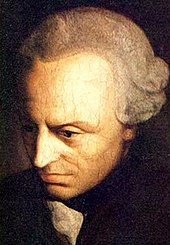Idealism is the epistemological doctrine that nothing can be directly known outside of the minds of thinking beings. Or in an alternative stronger form, it is the metaphysical doctrine that nothing exists apart from minds and the "contents" of minds. In modern Western philosophy, the epistemological doctrine begins as a core tenet of Descartes—that what is in the mind is known more reliably than what is known through the senses. The first prominent modern Western idealist in the metaphysical sense was George Berkeley. Berkeley argued[72] that there is no deep distinction between mental states, such as feeling pain, and the ideas about so-called "external" things, that appear to us through the senses. There is no real distinction, in this view, between certain sensations of heat and light that we experience,
Forms of idealism were prevalent in philosophy from the 18th century to the early 20th century. Transcendental idealism, advocated by Immanuel Kant, is the view that there are limits on what can be understood, since there is much that cannot be brought under the conditions of objective judgment. Kant wrote his Critique of Pure Reason (1781–1787) in an attempt to reconcile the conflicting approaches of rationalism and empiricism, and to establish a new groundwork for studying metaphysics. Kant's intention with this work was to look at what we know and then consider what must be true about it, as a logical consequence of the waywe know it. One major theme was that there are fundamental features of reality that escape our direct knowledge because of the natural limits of the human faculties.[73] Although Kant held that objective knowledge of the world required the mind to impose a conceptual or categorical frameworkon the stream of pure sensory data—a framework including space and time themselves—he maintained that things-in-themselves existed independently of our perceptions and judgments; he was therefore not an idealist in any simple sense. Indeed, Kant's account of things-in-themselves is both controversial and highly complex. Continuing his work,Johann Gottlieb Fichte and Friedrich Schelling dispensed with belief in the independent existence of the world, and created a thoroughgoing idealist philosophy.
The most notable work of this German idealism was G. W. F. Hegel'sPhenomenology of Spirit, of 1807. Hegel admitted his ideas were not new, but that all the previous philosophies had been incomplete. His goal was to correctly finish their job. Hegel asserts that the twin aims of philosophy are to account for the contradictions apparent in human experience (which arise, for instance, out of the supposed contradictions between "being" and "not being"), and also simultaneously to resolve and preserve these contradictions by showing their compatibility at a higher level of examination ("being" and "not being" are resolved with "becoming"). This program of acceptance and reconciliation of contradictions is known as the "Hegelian dialectic". Philosophers in the Hegelian tradition includeLudwig Andreas Feuerbach, who coined the term projection as pertaining to our inability to recognize anything in the external world without projecting qualities of ourselves upon those things; Karl Marx; Friedrich Engels; and the British idealists, notably T.H. Green, J.M.E. McTaggartand F.H. Bradley.
Few 20th century philosophers have embraced idealism. However, quite a few have embraced Hegelian dialectic. Immanuel Kant's "Copernican Turn" also remains an important philosophical concept today.

No comments:
Post a Comment